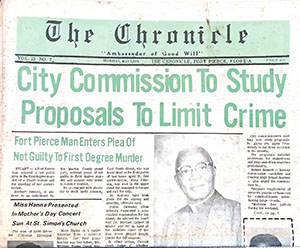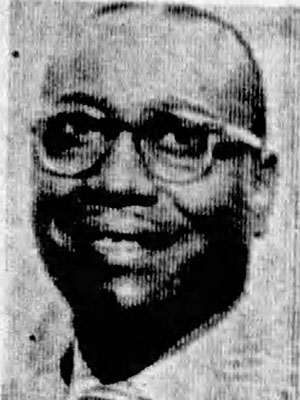Saving history one page at a time
 History can be tough enough to report in the best of circumstances.
History can be tough enough to report in the best of circumstances.
While reporting the Cow Creek Chronicles series that appeared in the most recent issues of this magazine, I was fortunate to rely on newspaper accounts dating back to the early 1900s for much of my research. The subjects of my reporting, the Raulerson and Sloan families, were well-known and I was able to create my narrative with the help of what appeared in the newspapers back then.
The Raulersons and Sloans were involved in many activities and much of what they were doing was documented in the newspapers. From the articles, I knew what clubs they belonged to, where they went to church, what they were accomplishing and what their children were involved in.

and operated
The Chronicle from 1957 to 1992.
Long before Facebook, the local newspaper was the social media of the day. If you were well-positioned in the community, you could give the editor — and later the society columnist — a ring on the phone and let them know what you were doing and it would appear in the next edition. A simple drive to Miami might turn out as: “John Smith motored to Miami yesterday.’’
Local newspapers up to the 1980s were full of these fillers, some in the early decades often appearing on the front pages of the newspapers.
But we found things starkly different when researching historical stories on the African-American community. Little could be found in the local archives of the Fort Pierce News-Tribune while writer Bernie Woodall was researching a story that appeared in the most recent issue of Fort Pierce Magazine on the 100th anniversary of Lincoln Park Academy, one of the first high schools in the state of Florida for black students. The same was true during research for Pattie Durham’s story appearing in this issue on Blessed Martin de Porres Catholic School for Colored Children that operated in Fort Pierce from 1940 to 1962.
Fortunately, we were able to find primary resources — preferred in all cases — of people who actually lived during those times — students who attended LPA and Blessed Martin. Our reporting also brought back to mind Fort Pierce’s black newspaper, The Chronicle, and we wondered whether we might find more news clippings about LPA or Blessed Martin from it.
The Chronicle was founded in 1957 by Charles E. Bolen, a former teacher and basketball and football coach at LPA who also had a column for the News-Tribune from 1951 to 1957 called the Colored Community News. As he started The Chronicle, Bolen recruited Zora Neale Hurston to move to Fort Pierce and work for him as a reporter. Hurston had been in a career decline and would only be celebrated as a significant 20th century writer after her death in 1960.
Bolen performed nearly all the functions of the paper — publisher, editor, reporter, photographer, ad salesman and deliverer — and I remember him at news conferences, almost always in a coat and tie, brandishing an old box camera like the one you’d seen Jimmy Olsen with in the old Superman television series.
The Chronicle was a labor of love that Bolen ran until his health forced him to fold the newspaper in 1992. He died in 1994.
Our search for Chronicle clippings from online sources and the St. Lucie County Library and the library at Indian River State College was unsuccessful.
“We have 100 years of newspapers but we do not have The Chronicle,” said Mia Tignor, dean of learning resources at IRSC. “We would love to get it.’’
Finding copies of The Chronicle, especially those from the days of Hurston, would add to the body of work of a significant 20th century American author.
Harry Quatraro of the St. Lucie County Regional History Center says the museum has two boxes of The Chronicle from the 1970s that the museum would like to get digitized, and Tignor said the college would be happy to work with the museum to make that happen.
So at least we’ll have a few years of The Chronicle for historians and genealogists to research. Another source for The Chronicle might be Franklin Crumpler, a former sheriff’s deputy and self-described pack rat who says he has old sections of the newspaper and is trying to locate them.
Finding and saving The Chronicle archives, an important part of Treasure Coast history, may take one page at a time.

Gregory Enns
Reach Gregory Enns or 772.940.9005.
See the original article in print publication
March 1, 2023
